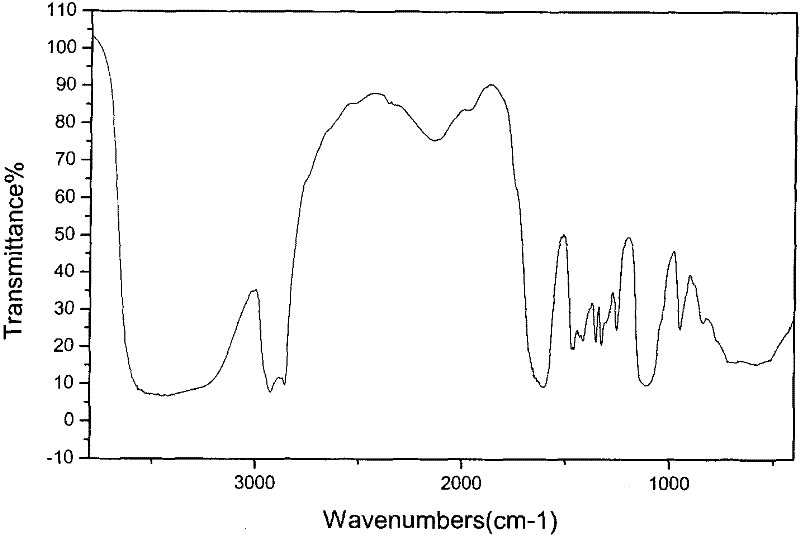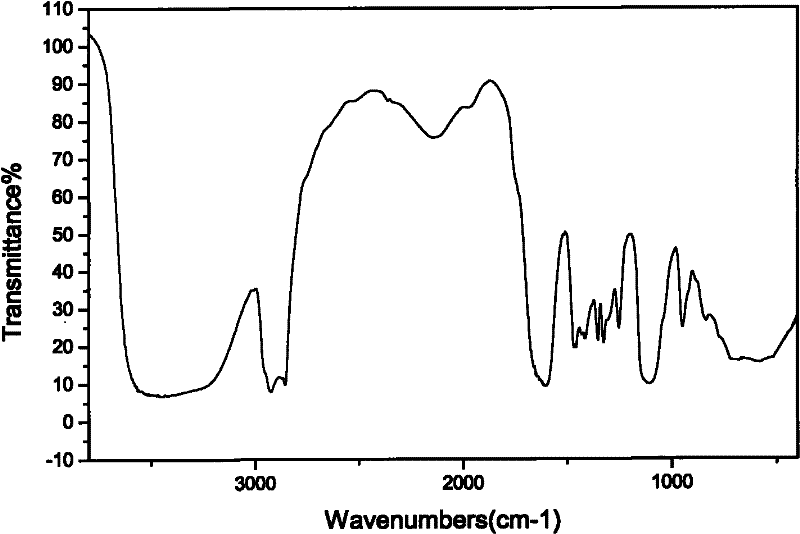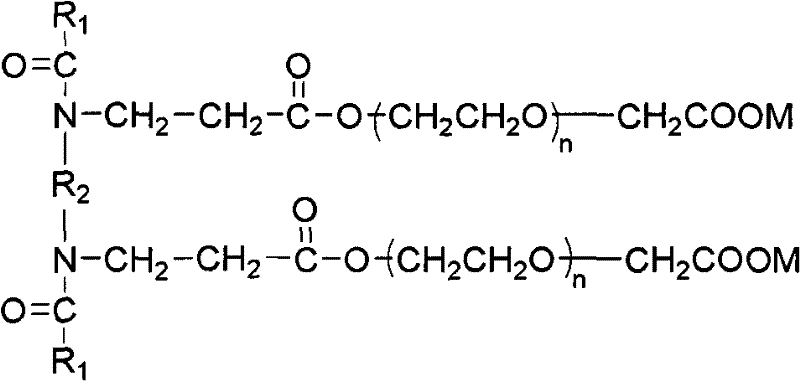Oil displacing method for reservoirs with high temperature and salinity
A high-temperature, high-salt, oil-displacing technology, applied in chemical instruments and methods, earthwork drilling, drilling compositions, etc., can solve the problem of alkali corrosion, high use concentration, and poor oil-displacing efficiency in ASP flooding problems, to achieve the effect of reducing interfacial tension capacity, high salinity resistance, and excellent performance
- Summary
- Abstract
- Description
- Claims
- Application Information
AI Technical Summary
Problems solved by technology
Method used
Image
Examples
Embodiment 1
[0034] (a) Synthesis of N, N-dilauroyl ethylenediamine dipropionic acid
[0035] 300 grams (1.5 moles) of lauric acid, 267.8 grams (2.25 moles) of thionyl chloride and 4.5 grams of DMF were added to a 1000-milliliter four-necked flask equipped with a sealed mechanical stirrer, a thermometer, a condenser tube, etc., and reacted at 90 ° C for 3 After one hour, excess thionyl chloride was distilled off under reduced pressure to obtain lauroyl chloride. Add 45.0 grams (0.75 moles) of anhydrous ethylenediamine and 180 grams of 1,4-dioxane to another 2000 ml four-neck flask equipped with a sealed mechanical stirrer, a thermometer, and a condenser tube, heat up to 50° C., and slowly Add 141.9 grams (1.65 moles) of methyl acrylate dropwise, continue the reaction for 3 hours after dropping, remove unreacted methyl acrylate and solvent 1,4-dioxane under reduced pressure, and the residue is methyl ethylenediamine dipropionate . Use 50wt% sodium hydroxide to adjust the pH of the reactio...
Embodiment 2
[0043] (a) Synthesis of N, N-dilauroyl hexamethylene diamine dipropionic acid
[0044] With [Example 1] (a), the difference replaces 45.0 grams (0.75 moles) of anhydrous ethylenediamine with 87.0 grams (0.75 moles) of anhydrous hexamethylenediamine, and the rest are the same to obtain N, N-dilauroyl Hexamethylenediamine dipropionic acid 328.5 grams, molar yield 70.2%.
[0045] (b) Synthesis of N,N-dilauroylhexamethylene diamine dipropionic acid dipolyoxyethylene ether (n=3)
[0046] With [Example 1] (b), the difference is 328.5 grams (0.578 moles) of N, N-dilauroyl hexamethylene diamine dipropionic acid instead of 300.3 grams (0.529 moles) of N, N-dodecanoyl ethyl The usage amount of diamine dipropionic acid and ethylene oxide is 152.7g (3.470 moles), and the usage amount of the basic compound of calcium is 8.6 grams, get) N, N-dilauroyl hexamethylene diamine dipropionic acid di Polyoxyethylene ether (n=3) 446.0 g, molar yield 86.9%.
[0047] (c) Synthesis of N, N-dilauroyl...
Embodiment 3
[0052] (a) Synthesis of N, N-didecanoyl butanediamine dipropionic acid
[0053] With [Example 1] (a), the difference replaces 300.0 grams (1.5 moles) of lauric acid with 261.0 grams (1.5 moles) of capric acid, and replaces 45.0 grams (0.75 grams) of anhydrous butanediamine with 66.0 grams (0.75 moles). mol) anhydrous ethylenediamine, and the others are the same to obtain 285.2 grams of N,N-didecanoylbutylene diamine dipropionic acid, and the molar yield is 69.9%.
[0054] (b) Synthesis of N, N-didecanoyl butanediamine dipropionic acid dipolyoxyethylene ether (n=3)
[0055] With [Example 1] (b), the difference is 285.2 grams (0.524 moles) of N, N-didecanoyl butanediamine dipropionic acid instead of 300.3 grams (0.529 moles) of N, N-dilauroyl ethylene dipropionate The consumption of amine dipropionic acid and oxirane is 138.3g (3.144 mole), and the consumption of the basic compound of calcium is 6.7 grams, obtains N, N-didecanoyl butanediamine dipropionic acid dipolyoxyethylene...
PUM
| Property | Measurement | Unit |
|---|---|---|
| shear viscosity | aaaaa | aaaaa |
| shear viscosity | aaaaa | aaaaa |
| shear viscosity | aaaaa | aaaaa |
Abstract
Description
Claims
Application Information
 Login to View More
Login to View More - R&D
- Intellectual Property
- Life Sciences
- Materials
- Tech Scout
- Unparalleled Data Quality
- Higher Quality Content
- 60% Fewer Hallucinations
Browse by: Latest US Patents, China's latest patents, Technical Efficacy Thesaurus, Application Domain, Technology Topic, Popular Technical Reports.
© 2025 PatSnap. All rights reserved.Legal|Privacy policy|Modern Slavery Act Transparency Statement|Sitemap|About US| Contact US: help@patsnap.com



